 |
Convert MXF to AIFF
|
MXF to AIFF Converter converts MXF files to
AIFF. The converter focuses on AIFF file that supports almost all codecs
in AIFF specification, for example, pcm 8-bit, pcm 16-bit, pcm 24-bit, pcm 32-bit,
pcm 32-bit float, pcm 64-bit float, a-Law, mu-Law, IEEE 754 float, ima4, gsm,
dwvw, and so on. The software also supports common file format such as MPA, M4R (iPhone ringtone), MMF, FLAC, AC3, OGG, AAC, VOC,
etc. It could convert OGG to AC3, MLP to AMR, AU to M4R (iPhone ringtone), DTS to MKA, MP4 to M4A (MPEG-4 audio), AU to MPA, and so on.
The software is very easy to use and supports batch conversion.
It is full compatible with 32-bit and 64-bit Windows 10/8/7/Vista/XP/2000.

What is MXF?
The Material eXchange Format (MXF) is an open file format, targeted at the
interchange of audio-visual material with associated data and metadata. It has
been designed and implemented with the aim of improving file-based interoperability
between servers, workstations and other content-creation devices. These improvements
should result in improved workflows and in more efficient working practices than
is possible with today's mixed and proprietary file formats.
MXF has been designed by the leading players in the broadcast industry - with
an enormous amount of input from the user community - to ensure that the
format really meets their demands. It is being put forward as an Open Standard
which means it is a file transfer format that is openly available to all interested
parties. It is not compression-scheme-specific and it simplifies the integration
of systems using MPEG and DV as well as future, as yet unspecified, compression
strategies. This means that the transportation of these different files will be
independent of content, and will not dictate the use of specific manufacturers¡¯
equipment. Any required processing can simply be achieved by automatically invoking
the appropriate hardware or software codec. However, MXF is designed for operational
use and so all the handling processes are seamless to the user. It just works
quietly in the background.
Besides offering better interoperability - working with video and audio
between different equipment and different applications - its other major contribution
is the transport of metadata. By developing MXF from the beginning as a new file
format, considerable thought has gone into the implementation and use of metadata.
Not only is this important for the proper functioning of MXF files, it will also
enable powerful new tools for media management as well as improving the content-creation
workflows by eliminating repetitive metadata re-entry.
The changing technologies in television production, and in transmission to
the viewers, means that the traditional methods for moving the content -
programme video and audio - within studios is changing too. Not only is there
far greater use of computers and IT-related products such as servers, but also
the reliance on automation and the re-use of material have expanded. Besides the
need to carry metadata, file transfers are needed to fit in with computer operations
and they must be capable of being streamed for real-time operations.
The development of the Material eXchange Format (MXF) is a remarkable achievement
of collaboration between manufacturers and major organizations such as Pro-MPEG,
the EBU and the AAF Association. It establishes interoperability of content between
various applications used in the television production chain. This leads to operational
efficiency and creative freedom through a unified networked environment.
MXF is a "container" or "wrapper" format which supports
a number of different streams of coded "essence", encoded with any of
a variety of codecs, together with a metadata wrapper which describes the material
contained within the MXF file.
MXF was developed to carry a subset of the Advanced Authoring Format (AAF)
data model, under a policy known as the Zero Divergence Directive (ZDD). This
enables MXF/AAF workflows between non-linear editing (NLE) systems using AAF and
cameras, servers, and other devices using MXF.
What is AIFF?
Audio Interchange File Format (AIFF) is an audio file format standard used for
storing sound data for personal computers and other electronic audio devices.
The format was co-developed by Apple Computer in 1988 based on Electronic Arts'
Interchange File Format (IFF, widely used on Amiga systems) and is most commonly
used on Apple Macintosh computer systems. AIFF is also used by Silicon Graphics
Incorporated. The audio data in a standard AIFF file is uncompressed big-endian
pulse-code modulation (PCM). There is also a compressed variant of AIFF known
as AIFF-C or AIFC, with various defined compression codecs.
Standard AIFF is a leading format (along with SDII and WAV) used by professional-level
audio and video applications, and unlike the better-known lossy MP3 format, it
is non-compressed (which aids rapid streaming of multiple audio files from disk
to the application), and lossless. Like any non-compressed, lossless format, it
uses much more disk space than MP3¡ªabout 10MB for one minute of stereo
audio at a sample rate of 44.1 kHz and a sample size of 16 bits. In addition to
audio data, AIFF can include loop point data and the musical note of a sample,
for use by hardware samplers and musical applications.
The file extension for the standard AIFF format is .aiff or .aif. For the compressed
variants it is supposed to be .aifc, but .aiff or .aif are accepted as well by
audio applications supporting the format.
- Free Download
MXF to AIFF Converter
- Install the software by instructions
- Launch MXF to AIFF Converter
- Choose MXF Files
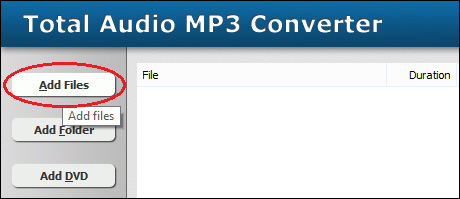
Click "Add Files" to choose MXF files and then add them
to conversion list.
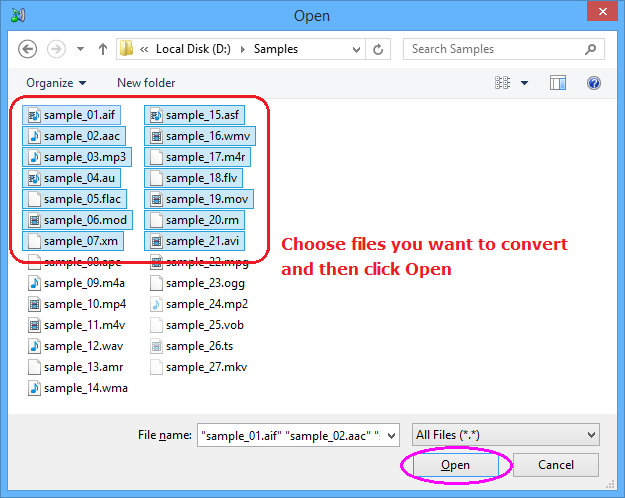
Choose one or more MXF files you want to convert and then click Open.
- Choose "to AIFF"
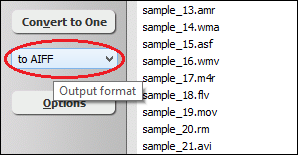
- Convert MXF to AIFF
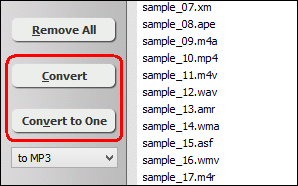
Click on "Convert" to convert MXF files to AIFF format; alternatively,
click on "Convert to One" to convert all files in list and
combine to a single one AIFF file.

The software is converting MXF files to AIFF format.
- Play and Browse AIFF File
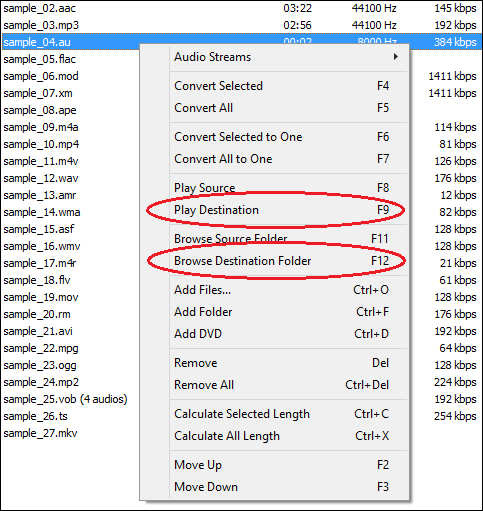
When conversion completes, you could right-click on converted file and choose
"Play Destination" to play the AIFF file; or choose "Browse
Destination Folder" to open Windows Explorer to browse the outputted AIFF
file.
Top
MXF to AIFF Converter is 100% clean and safe to install.
It's certified by major download sites.

MXF to AIFF Related Topics:
|

